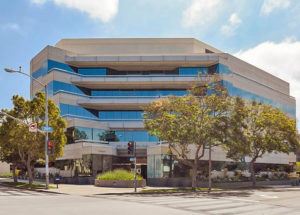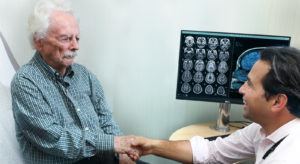

Brain health center offers comprehensive dementia care
by Guest Author
- Pacific Brain Health Center helps patients with a range of memory issues, including dementia.
- Patients undergo comprehensive exams and testing, and then are given a diagnosis and treatment recommendations.
- For better brain health, exercise, eat well, reduce stress, and keep the mind sharp with brain-focused activities.
The signs of memory loss in middle-age or older adults can be daunting, whether it’s forgetting someone’s name or getting lost while driving to a familiar destination. While there are many factors involved with memory issues, it’s natural for people to question if their forgetfulness may be a harbinger of dementia. They can get some much-needed answers at the Pacific Brain Health Center.

The center, part of the Pacific Neuroscience Institute in Santa Monica, CA, helps adults grappling with memory loss through providing a thorough diagnostic workup and treatment plan. Opened in July 2018, the center has already proven to be so valuable to the community that a planned expansion — doubling it from 3,700 square feet to 7,200 square feet — should be completed by fall of 2019.
As the first step in addressing memory loss, every patient who comes to the Pacific Brain Health Center is offered a comprehensive diagnostic workup to identify their case-specific causes of memory loss. From there, the health care team comes up with a treatment plan, including recommendations for services provided at the center and by community partners. Within the center itself, there are experts in geriatric medicine, neurology, psychiatry and psychology who endeavor to address a range of issues related to memory loss.

“It’s increasingly recognized that memory function with aging is affected by general physical health and all the things that can go wrong with the body — everything including blood pressure, blood sugar, hormone status, nutritional status and inflammation,” says David A. Merrill, MD, PhD, an adult and geriatric psychiatrist and the center’s director. “All these factors may drive memory loss so with identification and correction we are hopeful that will help stabilize brain function over time.”
That thoroughness applies to the center’s work with dementia patients. “Our dementia neurologist, Verna Porter, MD, is an expert in the assessment of memory loss,” Dr. Merrill says. “She starts with gathering relevant historical information from the patient, family and caregivers. There is also a physical exam and 30 to 45 minutes of office-based memory testing. From there, she formalizes those initial results into an action plan.”
That could entail an MRI to measure the size of the brain’s memory centers or a functional PET scan to look at blood sugar metabolism in the brain, which can be decreased in Alzheimer’s patients. The center also offers quantitative electroencephalography (qEEG) to aid in a dementia diagnosis. In some cases, Dr. Porter may recommend a lumbar puncture to look at cerebrospinal fluid, which Dr. Merrill says is a gold standard diagnostic tool for Alzheimer’s.
“These are the tools we use to get as definitive a diagnosis as possible,” he adds.
Another key component is cognitive function testing. Patients undergo intensive tests for four to five hours to help establish a pattern of the brain’s strengths and weakness. That information is conveyed to the patient and the family so they can see how it relates to daily activities, such as managing a household budget or safely driving a car.
“That can give families an accurate picture of what’s happening currently and then, based on what the causes are and what the prognosis would be, what sort of advanced planning needs to be done,” Dr. Merrill says.

Dementia interventions can be medical, neurological or psychological, as well as based on lifestyle modifications. Medical options include stabilizing blood sugar, hormones, or nutrition, as well as identifying toxins such as mercury exposure. “If those could be corrected, that can help the body’s health, which can translate to better brain health,” Dr. Merrill says. Neurologically, the center can prescribe medications, while psychiatric consultation is available for patients who are suffering from depression or anxiety.
When it comes to lifestyle factors, there are many things people can do for their brain health, whether they have received a dementia diagnosis or want to just generally improve cognitive function. One of the most important is physical activity, Dr. Merrill says.
“It’s definitely a use it or lose it hypothesis for brain cells. They form connections called synapses and there’s good evidence that physical activity promotes the preservation and strengthening of those connections between cells,” he says. “For sedentary individuals, if they can work up to two miles per day of movement that can be an initial goal. For more active people, the physical activity guidelines for heart and body health call for five miles or 10,000 steps a day. So graduated physical activity over time would be a good thing. But even if someone is frail, whatever movement is possible is good for the brain. Exercise is not a silver bullet, but it’s the closest thing we have.”
 Eating a nutritious Mediterranean or plant-based diet can also be good for brain health, along with learning techniques to reduce stress, such as meditation or deep breathing. Dr. Merrill adds that cognitive training is also important. That can include a computer-based program, learning a new language, playing an instrument or joining a book club. The last one also dovetails into the importance of socialization for seniors. “Cognitively stimulating social activities can be a windfall for brain health,” he says.
Eating a nutritious Mediterranean or plant-based diet can also be good for brain health, along with learning techniques to reduce stress, such as meditation or deep breathing. Dr. Merrill adds that cognitive training is also important. That can include a computer-based program, learning a new language, playing an instrument or joining a book club. The last one also dovetails into the importance of socialization for seniors. “Cognitively stimulating social activities can be a windfall for brain health,” he says.
If you are concerned about potential memory loss, either for yourself or a loved one, Dr. Merrill encourages coming in for an evaluation, and the earlier, the better. That way, a baseline can be established for cognitive function, and any co-occurring factors for memory loss can be spotted, such as a health issue or a prescription medication that impairs brain health.
Because dementia can manifest over a period of many years, Dr. Merrill says it can be considered a chronic condition — and that means patients may avail themselves of the center’s support groups, medical care and other resources for an extended period of time. That’s where Pacific Brain Health Center can play a valuable role.
“We see the center as a partnership with the community,” he says. “We’re open, we’re growing and we’re inviting participation from community members and their input on what services should be offered. It’s a collaboration and resource for the local community.”
To answer your questions about brain health call 310-582-7641 or schedule a consultation with the Pacific Brain Health Center today.
Adapted from original Providence Health & Services blog article published April 5, 2019
Last updated: March 26th, 2020